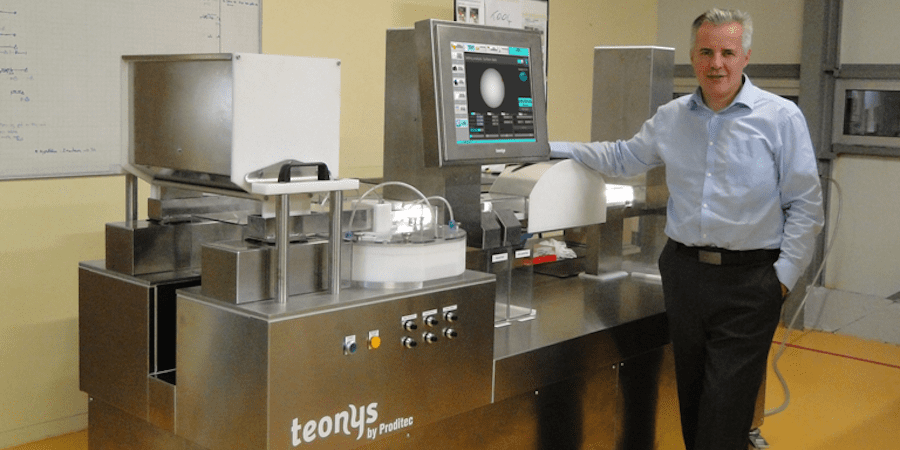
A leader can never stop running experiments
PROFILE – Before anything else, a good lean leader must be open to changing and continuously running experiments – something Christophe Riboulet, CEO of a small French manufacturer, knows quite a bit about.
Profile on: Christophe Riboulet, CEO, Proditec
Words: Roberto Priolo, Editor, Planet Lean
They say that to really embrace lean thinking one needs to have a certain predisposition to try new things and to change. As far as lean leaders go, Christophe Riboulet seems to fit the bill.
As CEO and President of his business, a French manufacturer of automatic inspection machines called Proditec, Riboulet has run his fair share of experiments over the years, some of which were particularly bold.
THE EVOLUTION OF THE COMPANY
For the past three decades, Proditec, which was founded in 1987, has supplied three main sectors: minting (with coins inspection machines), the plastic industry (with bottle caps inspection machines), and the pharmaceutical industry (with tablets and capsules inspection machines).
The first decision Riboulet made when he became CEO in 2005 was to only focus on one of these, and the choice was pharmaceuticals. “At the time, we were a very small company and it was hard for us to manage several customers around the globe with a vast range of products,” Riboulet explains. “So I decided that we’d be focusing on making the best possible products for the Pharmaceutical market.”
Two new products were added to the portfolio, and in less than four years, the part of turnover generated by the pharmaceutical industry went from 20% to 90% of the total revenue, with 90% of sales exported.
Handling such an impressive growth worldwide while serving a much more demanding market was not an easy task. In the pharmaceutical sector, customer expectations in terms of quality, delivery times and machine operation are very high. For Proditec, as more and more machines where delivered to the market, the cost of development and the cost of ensuring the right quality of machines went up dramatically.
“Judging by the financials, everything seemed fine, but in day-to-day operations fires broke all over the place,” he says. “When the economic crisis of 2008-2009 hit, and we experienced a decline in sales, we finally realized that something profound would have to change in the company if we wanted it to thrive in the challenging years to come.”
After becoming CEO, Riboulet tried all the classic moves to improve Proditec’s operations – from a new organizational structure to an ISO certification – but nothing seemed to help the company handle the complexity inherent to the pharmaceutical market and to new product development.
A VISIT THAT CHANGED EVERYTHING
It was in this scenario that, in 2011, Riboulet eventually turned to lean thinking, after reading Michael Ballé’s novel The Lean Manager. “The principles explained in the book appealed to me from day one. It all just sounded like common sense, and I could perfectly relate to the characters,” Riboulet explains. “‘Why are we not doing this?’ I wondered. I didn’t know how to put those lessons into practice yet, but I knew lean was the way to go for us.”
Luckily, Riboulet understood from the beginning that he was the one who would have to change and to personally understand and implement lean in his company. So, instead of looking for traditional consultants, he started to search for a sensei to work with.
He still recalls his first meeting with the potential “candidate” for the job: “It was a challenging moment. He had just come into my company and after two minutes on the shop floor he started to question our products, of which we were so proud. ‘Why would you need a 1.2-ton, 2.8-meter-long piece of equipment to inspect something that weighs only 1.5 grams?’ he would ask.” Incidentally, Proditec’s customers were also lamenting not having enough space to install those types of machines in their plants, and Riboulet realized his sensei was onto something.
BORN LEAN
Change is never easy, because it takes us out of our comfort zone. Yet, Riboulet seems rather unfazed by it, even in those situations – such as embracing the teachings of lean thinking – that call for a fundamental transformation in mindset.
This is not entirely surprising, as Riboulet’s evolution as a professional seems to suggest he has always been quite eager to improve and to find different ways to achieve more. Having started in the family business as a field engineer, Riboulet went on to become general manager of Proditec, after spending a year in the United States to get an MBA.
He confirms he has indeed always been inclined to change, to fixing problems with others, and to learning new things, “even before lean came along.” What the methodology gave him, he contends, is a “different way of seeing things, of managing, a framework to work better with people.”
For him, he claims, the biggest change lean brought to his life was perhaps the new definition of his role as a leader. “What I have learned is that my job is now to find those in the organization who have the potential to become leaders and to develop them so that they can build the next generation of products using the next generation of technologies. By having the ability of fixing today’s issues, they are prepared to address tomorrow’s growth challenges,” Riboulet says.
BACK TO BASICS
Interestingly, the first “lean” changes, which were targeted at protecting the customer and at stabilizing lead-times, ended up more than doubling the cash in the hands at the company.
With such a reserve, Riboulet decided to put Proditec in “startup mode” again. He invested heavily in new skills to implement the 21st century technologies needed for the next generation of products. Of course, as Riboulet explains, this impacted the short-term results of the company: “These days I value results very differently. Prior to lean, I was mainly focused on the ‘end of the year’ bottom line and we experienced above average financial performances. However, our products were not at the level of quality the market expected. Now, through continuous problem solving, we have a much better understanding of what it takes to make our customers smile, so we are ready to impact short-term results to insure the long-term success of the company. The quality of products and people’s skills level have become the real indicators of our improvement.”
There is little doubt that this small French company in the outskirts of Bordeaux would not have been able to achieve as much as it has without a leader who has made change an every-day feature of his business’ existence, rather than something people should be scared of.
Reflecting on his journey, Riboulet concludes: “As a CEO, you need to continuously challenge yourself to run experiments with your people and go in new directions.” And what is lean if not the constant search for next best way of doing something?

Read more


CASE STUDY – By leveraging Daily Management (DM), Supergasbras was able to change its trajectory and add more value to the customer in a critical sector for society.


OPINION – How many times, in the early stages of kaizen events, have you thought about giving up? Hang in there. As frustrating as they can be, they will also teach you a lot, says our Danish colleague.


CASE STUDY – Here’s the story of a mature lean company from Michigan. The author tells us about Zingerman’s Mail Order’s lean transformation, their challenges and their successes.


CASE STUDY – How do you keep up with a market changing at the speed of light? The Chief Inventor of an Australian digital company explains how they are using lean to safeguard their future.

